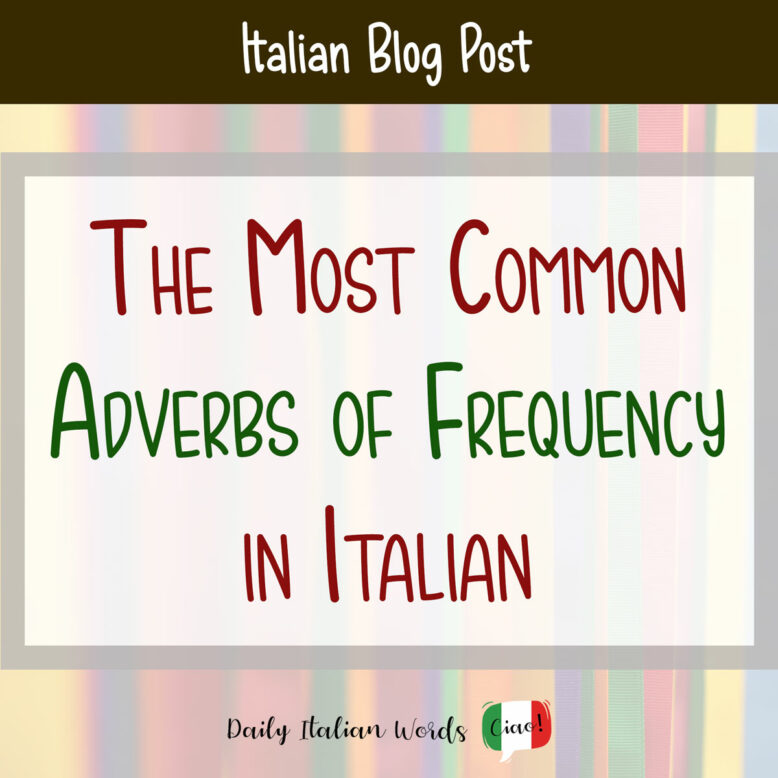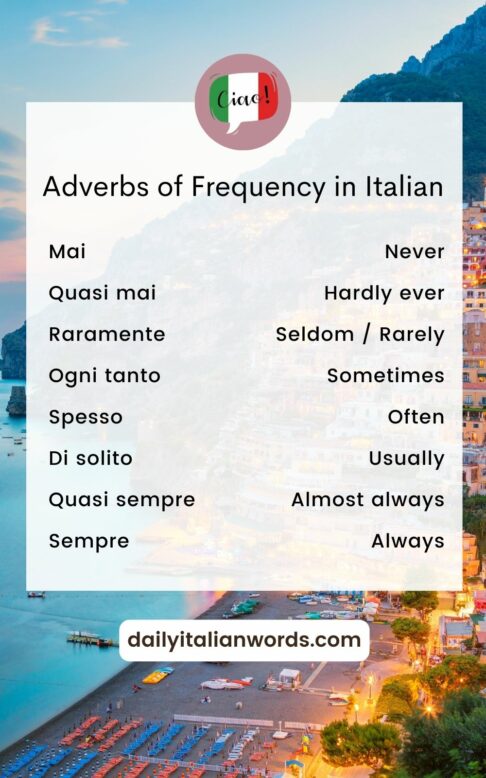In our everyday language, adverbs are scattered throughout our speech, but there’s a particular category that stands out for its significance – adverbs of time. Within this category, there exists a subset referred to as “adverbs of frequency,” which holds a pivotal role in conveying the frequency of events. These adverbs provide insight into how often an action takes place, without delving into the specifics of when exactly it occurs.
For instance, while the adverb domani designates an event happening tomorrow, the adverb spesso (often) doesn’t narrow down the timeframe to a specific moment.
Below you’ll discover the eight most commonly used adverbs of frequency in the Italian language. Accompanying each adverb is an illustrative sentence or two that effectively demonstrates its use in context. Enjoy!

Sempre
English meaning: always
Unlike in English, sempre goes after the main verb. In compound tenses, like the passato prossimo, it comes between the auxiliary and the past participle. You may see sempre at the end of a sentence if emphasis is being put on sempre (e.g. Prendo le vitamine, sempre. = I always take my vitamins.) but this is an exception to the rule.
Vado sempre in piscina.
I always go to the pool.
Ho sempre sognato di andare in Italia.
I always dreamed of going to Italy.
Quasi sempre
English meaning: almost always
Quasi sempre functions in the same way as sempre.
Leggo quasi sempre il giornale.
I almost always read the newspaper.
Hanno quasi sempre mangiato cibo da asporto.
They almost always ate take-away food.
Di solito
English meaning: usually
Synonyms: solitamente, abitualmente, comunemente, ordinariamente, generalmente
Di solito (and its various synonyms) can be placed after a verb, or it can appear at the beginning of a sentence.
Non è il genere di film che guardo di solito.
It’s not the kind of film I usually watch.
Di solito, ceno alle sette.
Usually, I eat dinner at seven.
Spesso
English meaning: often
Synonyms: frequentemente, di frequente, assiduamente, abitualmente, comunemente, in genere
Spesso comes either before or after the verb it modifies in Italian. It can appear at the beginning or end of a sentence.
Vado spesso in pizzeria.
I often go to the pizzeria.
Spesso mi sento triste.
I often feel sad.
Ogni tanto
English meaning: sometimes, every now and then, every so often
Synonyms: a volte, certe volte, qualche volta, talvolta, di tanto in tanto
Ogni tanto comes either before or after the verb it modifies in Italian. It can appear at the beginning or end of a sentence.
Ogni tanto mi piace rileggere questo libro.
Sometimes I like re-reading this book.
Vorrei che rimanessi qui ogni tanto.
I wish you’d stay here sometimes.
Raramente
English meaning: rarely / seldom
Synonyms: di rado, rare volte, poco, sporadicamente, infrequentemente
Raramente comes either before or after the verb it modifies in Italian. It can appear at the beginning or end of a sentence.
Raramente mangio la pizza con l’ananas.
I rarely eat pineapple pizza.
Davide e Paola escono con gli amici raramente.
Davide and Paola rarely go out with their friends.
Quasi mai
English meaning: hardly ever
Quasi mai functions in the same way as mai (never) – see below.
Non ascolto quasi mai la musica rap.
I hardly ever listen to rap music.
Da piccolo, non guardavo quasi mai la TV.
I hardly ever watched TV when I was little.
Mai
English meaning: never (also “ever” in interrogative statements)
Mai, when used as an adverb of frequency, is always accompanied by the negation non, creating a double negative. Unlike in English, mai goes after the main verb. In compound tenses, like the passato prossimo, it comes between the auxiliary and the past participle.
Non vanno mai al cinema.
They never go to the cinema.
Non hanno mai visto quel film.
They’ve never seen that film.
So, those are the most common adverbs of frequency in Italian! Why not try using one in a sentence in the comments below?

Heather Broster is a graduate with honours in linguistics from the University of Western Ontario. She is an aspiring polyglot, proficient in English and Italian, as well as Japanese, Welsh, and French to varying degrees of fluency. Originally from Toronto, Heather has resided in various countries, notably Italy for a period of six years. Her primary focus lies in the fields of language acquisition, education, and bilingual instruction.



